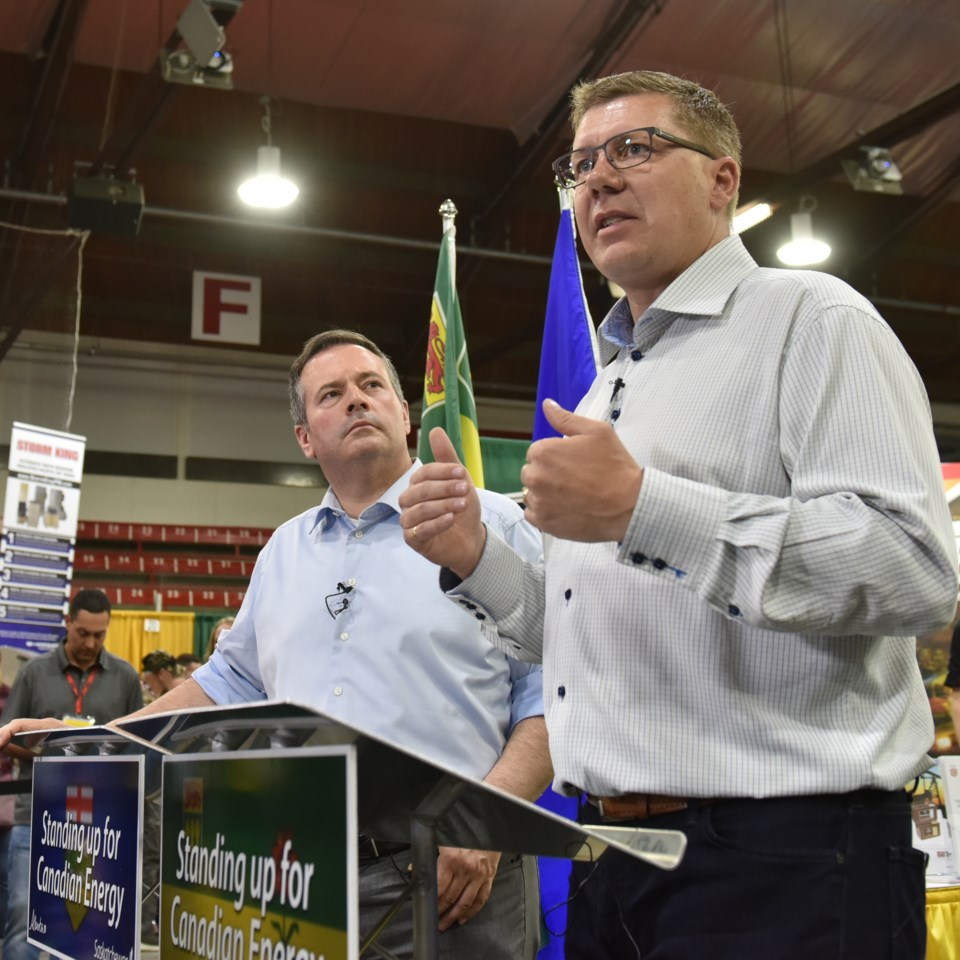Regina – For much of the past year, Premier Scott Moe has been speaking loudly of the challenges the oilpatch has been living with. Now, with a federal election on Oct. 21, Pipeline News asked him what are the issues facing the oilpatch in this election.
He replied, “The issues facing the oilpatch in this federal election I would put forward are threefold. I’ve always said, we need the three “T’s” in order to be successful to be here in Saskatchewan, economically and environmentally. The same holds true for the oil sector in the province.
“We need trade agreements around the world. We need to have that steady, consistent trade environment. We have some of that, as it pertains to oil. I think we would like a little more consistent and sustainable trade environment.
“Secondly is the transportation of which we have talked about at great length, with respect to not only getting our product to the U.S. market but getting it to the world. And we should be getting it to the world, because of the manner it is produced. Not only from an ethical labour standards, but from an environmental standard.
“Last but not least is the tax environment that we operate under here in this nation and in Saskatchewan, as part of the nation of Canada. We have had repeated challenges with respect to our tax and regulatory environment coming from our federal government. The most notable among those, obviously, is the carbon taxation policy that they have imposed on this sector, in particular, but also all Canadians.
“I would also put forward the constraints that would come about by the introduction and operation of Bill C-69, which scared away one proponent, the Energy East Pipeline. Bill C-48 essentially shut down the Northern Gateway project. There’s other items that have been put forward as well that have been impacting the energy sector, from a Canadian perspective, not specifically Saskatchewan,” he said.
An example is a drilling moratorium in the north shelved any hopes of the Mackenzie Valley Pipeline, which Northwest Territories’ premier has talked about repeatedly. These are all policies that are disallowing our economy in this province, he noted.
He talked of the advantages of a pipeline like the now-defunct Energy East pipeline, from Hardisty, Alta. to Saint John, N.B., where it could have value added to the product, and buffering us from challenges in the industry like price spikes. It would also allow us to export to the world.
Moe has been a proponent for a national energy corridor, one that several Conservative premiers are also advocating. It would encompass pipelines for oil and natural gas, as well as power transmission lines. “For a host of reasons, we should be having a conversation, and maybe we will be, at the premier’s level, on a national energy corridor.”
“How that impacts on Saskatchewan, and I think Canada is very similar, 70 cents of every dollar is exported, essentially. If we were able to export our energy to other areas of Canada, sustainable energy products, whatever that might be, it bodes well for the sustainability of the Canadian economy. They are used in a number of ways, in Canadian industries that are then creating value in communities across Canada, or they are adding value to, as in Saint John, and exported around the world.
“We most certainly have to have the conversation around a national energy corridor. I think, in fairness, we have to have the same conversation from the perspective of provinces like Quebec, Newfoundland and Labrador, and Manitoba – areas that expanded their hydro power and they are looking to get that hydropower to customers not only in Canada, but the U.S. as well.”
“Ultimately, when we have access to that energy, whether its hydropower, oil, or natural gas, when we have that access across our nation, it allows us to be more competitive,” Moe said.
He noted Canada is an ethical producer.
Moe said all people want to address a cleaner environment for the next generation.
“We now have the federal NDP who want to move forward with a policy, a Quebec platform, if you will. In a national campaign. They feel it’s necessary to have a specific platform for a specific region of the nation where they have said they would essentially give a veto to the province of Quebec, but not to any other provinces, across the nation,” Moe said. “The NDP characterizes this as ‘asymmetrical federalism.’ I firmly believe this is nothing more than a good way to wreck out country.”
Moe said, “We need to understand when wealth is created in one area, one region of this nation, that it is not only good for the people living in that area, it is good for all Canadians. And we need to work together on topics like a national energy corridor so that we can extend the opportunity to benefit from that wealth, like the sustainable oil produced in this province, into other areas of the nation, like Saint John, New Brunswick, like central Canada into Quebec and Ontario.
He said, “If the federal government is not willing to partake in it, it is one I will continue to lead at the premier’s table.”
Editor's note: a request to Saskatchewan NDP Leader Ryan Meili's office for a similar interview did not receive a reply.��
��




